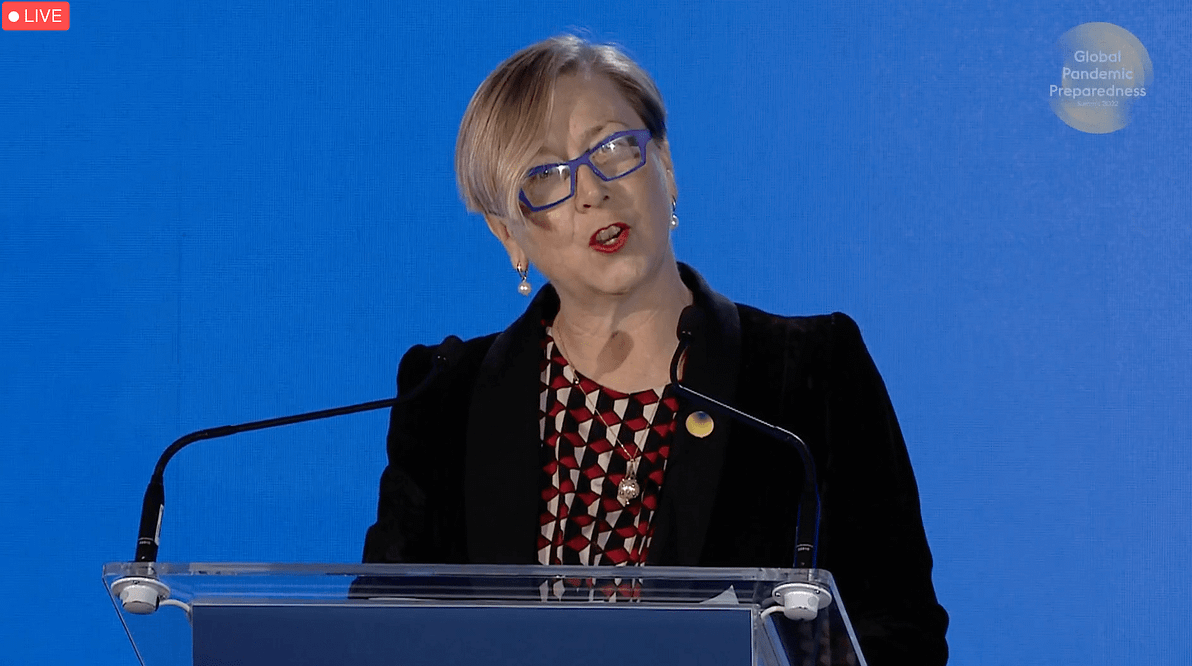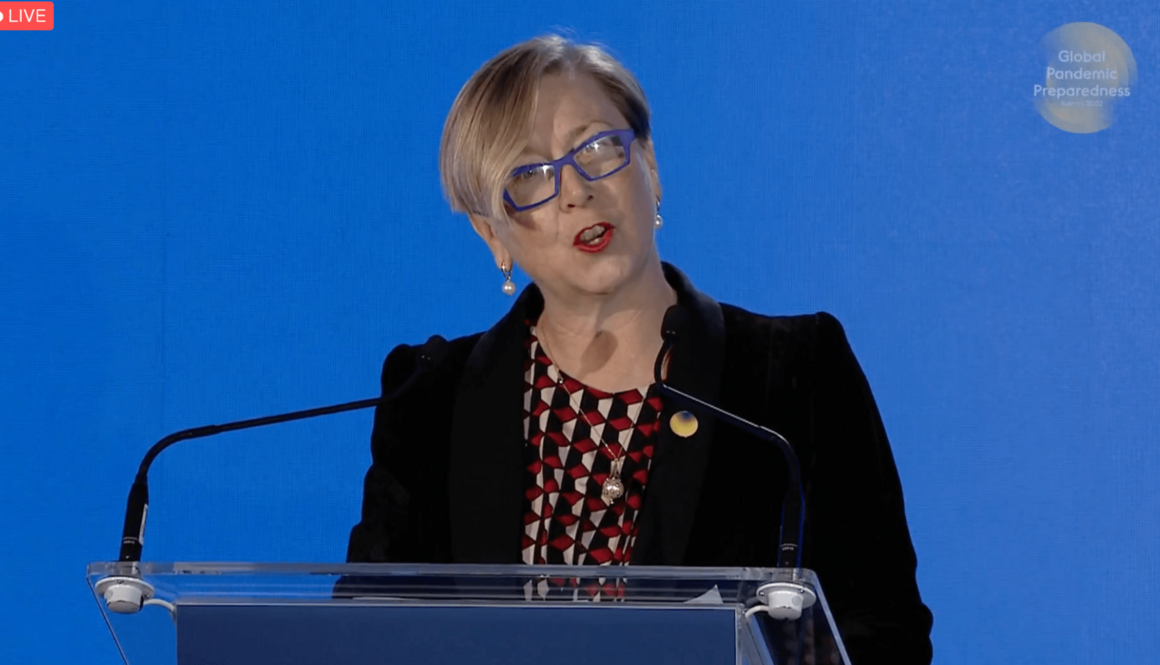Health Policy Watch
Kerry Cullinan
08/03/2022
CEPI Chairpseron Jane Halton
Executive Summary
by Joaquim Cardoso MSc.
Chief editor of “The Health Strategy Blog”
March 8, 2022
- The Coalition for Epidemic Preparedness Innovations (CEPI) raised over $1.5 billion to develop vaccines against emerging diseases in as little as 100 days over the past two days at a pandemic preparedness summit co-hosted by the UK government.
- CEPI’s total budgetary ask is for $3.5 billion to implement its five-year plan to prepare and protect against “Disease X”, the unknown pathogen that will cause the next pandemic.
It has developed a roadmap to
- compress vaccine development to 100 days,
- develop a broadly protective vaccine against COVID-19 and other Betacoronaviruses, and
- create a “library” of vaccine candidates for use against known and unknown pathogens.
“In the case of COVID-19, a 100-day timeline would have seen a vaccine ready to use in mid-April instead of December 2020. This could have saved millions of lives and trillions of dollars.
ORIGINAL PUBLICATION (full version)

The Coalition for Epidemic Preparedness Innovations (CEPI) raised over $1.5 billion to develop vaccines against emerging diseases in as little as 100 days over the past two days at a pandemic preparedness summit co-hosted by the UK government.
The Coalition for Epidemic Preparedness Innovations (CEPI) raised over $1.5 billion to develop vaccines against emerging diseases in as little as 100 days over the past two days
CEPI’s total budgetary ask is for $3.5 billion to implement its five-year plan to prepare and protect against “Disease X”, the unknown pathogen that will cause the next pandemic.
CEPI’s total budgetary ask is for $3.5 billion to implement its five-year plan to prepare and protect against “Disease X” …
It has developed a roadmap to
- compress vaccine development to 100 days,
- develop a broadly protective vaccine against COVID-19 and other Betacoronaviruses, and
- create a “library” of vaccine candidates for use against known and unknown pathogens.
It has developed a roadmap to: (1) compress vaccine development to 100 days, (2) develop a broadly protective vaccine against COVID-19 and other Betacoronaviruses, and (3) create a “library” of vaccine candidates for use against known and unknown pathogens.
As part of this, CEPI on Tuesday that it will partner with UK-based DIOSynVax — a biotech company linked to the University of Cambridge that specialises in the development of broadly protective, multi-virus vaccine antigen payloads (VAPs).
Betacoronavirus vaccine candidate
Together, they aim to develop a vaccine candidate based upon “intelligent computational design” against existing and future variants of SARS-CoV-2 and other major sub-genera of Betacoronaviruses including those that cause SARS and MERS.
The idea of a 100-day mission came from a commitment made by leaders at the G7 meeting in June last year to “support science in a mission to shorten the cycle for the development of safe and effective vaccines, treatments and tests from 300 to 100 days”.
“CEPI’s five-year strategy aims to make the development of vaccines against emerging pathogens within 100 days a reality, because the quicker a safe, effective and globally accessible vaccine is developed and deployed, the quicker an incipient pandemic can be contained and controlled,” the organisation said in a statement on Tuesday.
“Achieving the 100 Day Mission, through CEPI’s innovative programme of access-focused R&D, would give the world a fighting chance of defusing the threat of future pathogens with pandemic potential.”
Over the past two days, health ministers, pharmaceutical company executives and other partners met in London and made a number of pledges to protect the world against future threats.
The UK Government has committed to delivering a research and development network, accessible to industry, to speed up the development and delivery of novel vaccines.
The UK Government has committed to delivering a research and development network, accessible to industry, to speed up the development and delivery of novel vaccines.
Meanwhile, associations representing vaccine manufacturers, as well as the broader biotech and biopharmaceutical industry and the International Federation of Pharmaceutical Manufacturers & Associations ( IFPMA) committed to investing in R&D aimed at “target pathogens with epidemic and pandemic potential and to build a portfolio of promising candidate vaccines, treatments and technologies”.
Commitment to speed
They also committed to speeding up vaccine manufacturing and capacity, as well as clinical trials.
“The faster an effective vaccine is developed and deployed, the faster an incipient pandemic can be contained and controlled,” according to CEPI.
They also committed to speeding up vaccine manufacturing and capacity, as well as clinical trials.
“In the case of COVID-19, a 100-day timeline would have seen a vaccine ready to use in mid-April instead of December 2020. This could have saved millions of lives and trillions of dollars. Achieving the 100-day goal would give the world a fighting chance of containing an outbreak before it spreads globally and becomes a pandemic.”
“In the case of COVID-19, a 100-day timeline would have seen a vaccine ready to use in mid-April instead of December 2020. This could have saved millions of lives and trillions of dollars.
“COVID-19 has taught the global healthcare community hard but important lessons. Let’s use them to make our defences against the next pandemic more nimble, more robust, and — above all — more equitable,” said IFPMA Director General Thomas Cueni.
“We have seen the strength of a strong innovation ecosystem leading to the rapid development of multiple solutions, acting to expand partnerships, knowledge-sharing, and technology transfer in unprecedented ways,” he added, commending CEPI for bringing people across the innovation ecosystem to address COVID-19.
Originally published at https://healthpolicy-watch.news on March 8, 2022.
Names cited
CEPI Chairpseron Jane Halton
IFPMA Director General Thomas Cueni.












